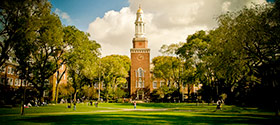Programs
Advance Your Career

Want to learn more about our graduate programs? Fill out our Graduate Admission Request Information form for more information. $0 application fee.
The Department of Psychology offers four specialized masters of arts (M.A.) degrees. Learn more about our programs below.
Experimental Psychology M.A.
Students in our program attain professional-level expertise in classical and current psychological theories and research, methods of data collection and analysis, effective communication and ethical conduct. Students learn to ask and answer questions in the psychological sciences, and have the opportunity for professional development and mentoring. Our students are prepared for a wide range of careers and admittance into doctoral programs.
Industrial and Organizational Psychology—Group Processes and Organizational Behavior M.A.
This program is one of two programs in the psychology department focusing on industrial and organizational (I/O) psychology. The Group Processes and Organizational Behavior program (previously: Human Relations) aims at careers in organizational research, organizational development, organizational change, or organizational consulting, which is the aspect generally covered by organizational psychology. The organizational aspects of I/O psychology include communication in the workplace, leadership, power and influence, and organizational structure and design.
Industrial and Organizational Psychology—Personnel and Human Resources M.A.
This program is one of two programs in the psychology department focusing on industrial and organizational (I/O) psychology. The Personnel and Human Resources program (previously: Organizational Behavior) aims at careers in personnel and human resources, which is the aspect generally covered in industrial psychology. The industrial aspects of I/O psychology include, among other topics, human resource management, performance evaluation, job analysis, recruitment, and employee training.
Mental Health Counseling M.A.
The 60-credit master's degree in Mental Health Counseling (MHC) prepares students to work as mental health counselors within medical, community and private practice settings. Through rigorous academic course work and clinical internship training, students learn to apply mental health approaches to contemporary practice, assessment and treatment. The MHC Program provides in-depth exposure to three principal approaches to counseling: psychodynamic, experiential/humanistic and cognitive-behavioral. In addition to the internship, students perform intake evaluations and psychotherapy at the college's counseling center. The program focuses primarily on clinical work with adults and families. After 3,000 hours of supervised, post-degree experience, students are eligible to take an exam for licensure permitting private and independent practice of counseling.






